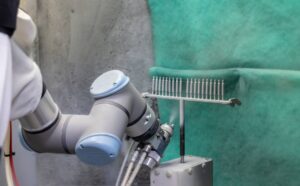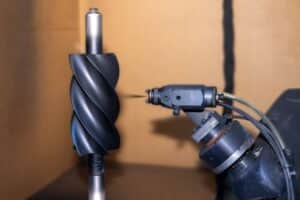In 1964, Chicago-based Orion Industries was founded by a young entrepreneur who envisioned great possibilities for the use of coatings to improve the functional properties of parts and assemblies. That entrepreneur was Bruce Nesbitt. Little did he know that his love of cars and motorsport racing combined with an insatiable curiosity for how to make things work better would result in the development of a leading enterprise in the functional industrial coatings industry.
It began in late 1963. While recovering from a badly broken ankle, Nesbitt, 23, read a magazine article about a special coating that was used by the Porsche factory to help them win a 24-hour race in Le Mans, France. The coating was called Alpha Molykote, and it captured his interest – so much so that he enlisted a friend’s help with requesting samples of the coating. Another friend worked for a spray-gun manufacturer and was able to lend him a small spray gun and an air compressor. Seeing for himself how effective the molybdenum disulfide lubricant coating was, he decided to go into business coating race car parts. The name Orion, which is the astrological sign of the hunter, seemed fitting, he says.
Humble Beginnings
With no money but an abundance of ambition, Nesbitt printed flyers to promote Orion’s coating services and established his headquarters at his parents’ home. He wasted no time contacting the many Chicago area race car clubs to sell them on the benefits of the “mechanically magical coating” for camshafts, pistons and other moving engine parts.
“There were so many unrelated sets of circumstances melded together to provide the scintilla of a capitalistic venture,” Nesbitt says. “I did not have a roadmap because this was technology very few people knew about. I spoke about the coating to anyone who would listen.”
As word spread about the company and its promising coating, Nesbitt moved his company to Chicago’s West Loop in 1965. “One day I got a call from Berry Bearing Company,” Nesbitt says. “The caller asked me if I’m the guy that’s buying this Alpha Molykote from Dow Corning, and I said yes.”
That connection would lead to further opportunities and growth for Orion, which began coating such products as solenoids for vending machines, cash register components, and other functional industrial products. In 1968, a customer that manufactured water conditioners wanted Orion to coat the inside of its conditioner valves, but the original coating was insufficient. That’s when Orion made its first foray into using Teflon™ coatings from DuPont (now Chemours). Orion became an authorized licensed applicator of Teflon™ in 1979, solidifying its reputation in the industrial coatings industry.
The “What If” Factor
For those who worked alongside Nesbitt as Orion Industries grew to be one of the most technologically advanced functional coating applicators in the industry, there was an aspect to his approach to business that was ever present: the “What if” factor. He and the Orion team continually explored ways to improve the status quo.
With each new customer challenge, they leveraged their growing knowledge about functional coatings, including Teflon®, the most notable of all coatings ever developed, and applied the “What if…” factor. In this way, they came to fully understand a project’s technical requirements and match that with the right coating formulation and application process to resolve issues such as friction, sticking, corrosion, noise, and abrasion to improve the performance of finished products and components and help increase their value and lifespan.
As the company expanded its capabilities within the industrial coatings industry, it expanded into new markets. Today, Orion Industries serves a variety of industries around the world, including aerospace, defense, automotive, food processing, agriculture, chemical processing, water service and numerous manufacturing applications. In 2008 Orion spun off a new company, Surface Solutions Group, LLC (SSG), to focus on its growing medical device coating business. Orion would move to increasingly larger facilities twice more, landing at its present location at 5492 N. Northwest Highway in Chicago in 2016, while still keeping its previous location down the street at 5170 N. Northwest Highway.
On the Forefront of Innovation in the Industrial Coatings Industry
Since first grasping the potential for Alpha Molykote, Orion has remained on the forefront of technological advancements and material science innovations by working with functional coating research laboratories and manufacturers to develop new and improved coatings. The Orion team developed more than 52 U.S. patents related to the functional industrial coatings industry.
Orion has significantly increased its offering of functional coating formulations through the years, many of which it developed or co-developed via its active in-house coating lab. For example, its FluoroPlate® line of functional industrial coatings, introduced in 1994, consists of proprietary coatings from Orion, which were developed to provide dry lubrication and corrosion protection primarily for automotive industry products and spring manufacturers, along with popular coatings from respected coating suppliers, such as Teflon™ and Xylan® PTFE and FEP, Halar® ECTFE, Tefzel® ETFE, among others.
On the coating application side, if a project required application tools and techniques not available on the market, the Orion team, which included tool and die makers who were skilled at using milling machines and lathes, would often design and build a custom machine or system to perform the job. This is something they still do today.
Orion began automating its operations in the 1960s, using chain-on-edge conveying systems. In the late 1980s, as automation became more widely used in the industrial coatings industry, it was primarily by use of X-Y axis machinery that was designed to mimic manual application methods. It worked great for straightforward flat or round parts but was less effective for coating the more complex parts that Orion specialized in.
For example, Orion automated the application of Teflon coatings on the interiors and exteriors of Calphalon cookware and bakeware from the early 1980s through the early 1990s, showcasing its advancements in the industrial coatings industry. As much as this form of automation helped advance application processes, it achieved at best only about 70 percent coating application efficiency. Today, Orion has five 6- and 7-axis robotic cells, and plans to install more in the future.

“We had to find a way to precisely manage the amount of coating being applied to every part and make it repeatable to meet customers’ exacting tolerance requirements,” Nesbitt says.
Applying the “What if…” process, Orion’s use of statistical process controls (SPC) and consistent part-to-part measurement ultimately made it possible to develop a computer-controlled system that could auto dispense the same amount of coating from a spray gun, within control limits, when coating the same part. Finally, there was a coating system that offered the repeatability necessary to hold diameters to ±3 microns.
The patented application system was first used on production parts for the automotive industry in 1996. Called Dimension Bond®, it uses lasers to meter the displacement of its DB L-908 conformable coating and then calculate the thickness of the coating before the parts are conveyed into the oven to cure. It was groundbreaking.
Today, due to advances in digital technologies and Orion’s ongoing “What if…” inquisitiveness, variances in the application of the coatings (more than 100 different formulations) have been reduced to only ±3 microns on a tight tolerance of 12-18 microns, a breakthrough for the industrial coatings industry. For the Orion team, it is an ever-evolving process.

Orion’s corporate vision encompasses being the eyes and ears of the customer; employees work together cohesively with the goal of never shipping substandard products. In its quest to maintain operational excellence the company sought out and earned quality certifications, including ISO 9001 (held since 2007) and AS9100D and International Traffic in Arms Regulations (ITAR) (registered since 2015).
Building An Innovating Culture
Nesbitt retired and sold the company in 2021 to Elektrisola, a family owned and operated company headquartered in Germany. Orion continues to be managed independently, with continuity of leadership under President Kevin Hess, who previously served for four years as vice president. In addition, Orion’s GainSharing program, instituted in April of 2003, unified employees and reinforced the quality-first culture.
“Rather than just creating jobs it was more important to nurture careers,” Nesbitt says. “We developed a close-knit culture at Orion. We get to know not just the employees but their families. There’s a sense of community within the organization.” The company benefits from many long-term employees – a testament to its successful approach to management.
At Orion Industries, 60 years have come and gone in a flash, but the culture of innovative thinking, problem solving and advanced industrial coating technologies lives on.
Looking for an innovative partner to help you with your functional coating needs? Contact us to speak with a engineer about your project.